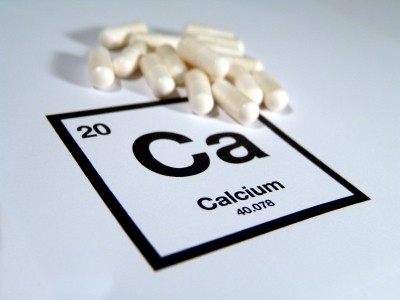Review: ‘No concern about excess CVD risks associated with calcium supplements’

“For people with low-bone density and low absolute risks of CVD, the present report demonstrates no concern about excess CVD risks associated with calcium supplements,” the team of international researchers wrote on behalf of the Calcium Supplements Treatment Trialists’ Collaboration.
The researchers evaluated 11 trials, including seven comparisons of calcium to control (n = 8,634) and six comparisons of calcium plus vitamin D to control (n = 46,804).
Considering the hazards
Calcium supplements, particularly when accompanied by Vitamin D, have long been used to treat or prevent bone disease like osteoporosis, which has been described as a silent killer. In the last ten years, however, studies have emerged questioning the safety of calcium supplementation, linking it to coronary artery calcification and increased cardiovascular risk.
A 2012 study led by Zurich University’s Institute of Social and Preventative Medicine, for example, cautioned against calcium supplementation, suggesting that it could double the risk of heart attack incidence. More recently, a large retrospective cohort study concluded that “the cumulative incidence and hazard ratio for acute myocardial infarction, ischemic stroke and death events were higher in the calcium supplementation group than in the control group in a Korean population after adjusting for confounding variables.”
This latest meta-analysis, however, adds to the overall body of science supporting the potential safety of calcium supplements, previously buttressed by a Harvard Medical School study and findings published in Osteoporosis International, among others, showing no effect on coronary artery calcification.
No excess risk in people with low absolute risks
For this review, the research team conducted a systematic search of randomized, placebo-controlled calcium supplement trials reported in the PubMed, Medline and Embase databases, as well as the Cochrane Central Register of Controlled Trials. This was supplemented by a search of reference lists of individual trials, review articles or previous meta-analyses of calcium and risk of coronary heart disease, stroke or all-cause mortality.
“This meta-analysis demonstrated that calcium supplements were not associated with any significant hazard for coronary heart disease, stroke or all-cause mortality and excluded excess risks above 0.3%–0.5% per year for coronary heart disease or stroke,” the researchers stated.
Likewise, the six trials evaluating the combined calcium and vitamin D treatment showed no significant associations between supplementation and any type of excess risk.
The study called for further large trials "to assess the efficacy and safety of combined supplementation with calcium and vitamin D for the prevention of osteoporotic fracture in older people at high risk of CVD.”
Confidence in the safety of calcium supplements
Commenting independently on the findings, Andrea Wong, PhD, senior vice president of scientific and regulatory affairs at the Council for Responsible Nutrition (CRN) told NutraIngredients-USA: “This meta-analysis is the latest research to reinforce the safety of calcium supplementation. Since many Americans don’t get enough calcium in their diet, supplementation can play an important role in meeting nutrient needs. This research, along with several other studies, should provide confidence in the safety of calcium supplements for heart health."
In addition to the health benefits, Dr. Wong refers to the CRN Health Care Cost Savings study, which identified an average net savings of $17 billion per year in health care costs associated with osteoporotic fracture if the entire target population of adults over the age of 50 were to supplement daily with calcium and vitamin D.
Source: Current Developments in Nutrition
“Calcium Supplements and Risk of CVD: A Meta-Analysis of Randomized Trials”
doi: doi.org/10.1016/j.cdnut.2023.100046
Authors: Xiquian Huo et al.














